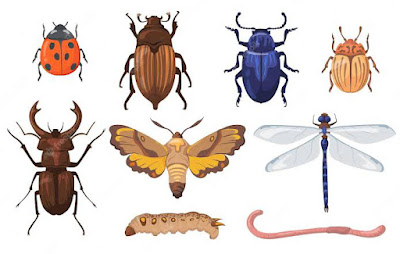Economic importance of Insects
Pollination:
Insects are essential for the pollination of many crops, including fruits, vegetables, and nuts. Pollinators, such as bees, butterflies, moths, and beetles, transfer pollen from one plant to another, which allows for fertilization and seed production. Pollination by insects contributes to the production of approximately one-third of the world's food crops, with a value estimated at $235 to $577 billion annually. Without pollination by insects, many crops would not be able to produce fruits or seeds, resulting in significant economic losses.Pest Control:
Insects are not just pests; they can also be beneficial for controlling other pests. Insects such as ladybugs, lacewings, and parasitic wasps can help to control populations of harmful insects such as aphids, caterpillars, and whiteflies. These beneficial insects are often used in integrated pest management (IPM) programs to reduce the use of chemical pesticides, which can be harmful to both the environment and human health. The use of beneficial insects in IPM can lead to significant cost savings for farmers and other agricultural producers.
Food Production:
Insects are not only important for pollination but also as a source of food. In many cultures, insects have been a traditional source of protein for centuries. Insects such as crickets, grasshoppers, and mealworms are high in protein and can be farmed more sustainably than traditional livestock. Insects are also more efficient at converting feed into protein than traditional livestock, which can reduce the cost of food production. The global market for insect protein is expected to grow significantly in the coming years, with a potential value of $8 billion by 2030.
Read also: economic importance of mosquitoes
Silk Production:
Insects such as silkworms are used to produce silk, a valuable commodity that has been traded for thousands of years. Silk is produced by the larvae of the silk moth, which spins a cocoon made of a single thread of silk that can be up to 900 meters long. The cocoons are harvested and processed to produce silk fabric, which is used for clothing, home textiles, and other products. The global silk market is valued at approximately $14 billion annually.
Honey Production:
Bees are not only important pollinators but also produce honey, a valuable commodity that has been used for food, medicine, and other purposes for thousands of years. Honey is produced by bees from the nectar of flowers, and the honeycomb is harvested and processed to produce honey. Honey is used in a variety of food products, such as baked goods and beverages, and has also been used in traditional medicine for its antibacterial and anti-inflammatory properties. The global honey market is valued at approximately $9 billion annually.
Medicine Production:
Insects have been used in traditional medicine for centuries and are still used today in many cultures. Insects such as ants, bees, and wasps produce venom that has been used for pain relief and as an anti-inflammatory. The blood of horseshoe crabs contains a compound called Limulus amebocyte lysate (LAL), which is used to test for bacterial contamination in medical equipment and drugs. The use of insect-derived compounds in medicine has the potential to lead to new treatments for a variety of diseases and conditions, with significant economic benefits.
Biological Control:
Insects are not only important for controlling pests, but they can also be used to control invasive species and weeds. Biological control involves the use of natural enemies, such as insects, to control the population of a pest or invasive species. Biological control can be more sustainable and cost-effective than chemical control, which can have negative impacts on the environment and human health. The use of biological control can also reduce the economic costs associated with invasive species, which can cause significant damage to crops, natural resources, and infrastructure.
Ecotourism:
Insects are not just important for their economic benefits but also for their role in ecotourism. Many people travel to see insects, such as butterflies, beetles, and bees, in their natural habitats. Ecotourism can provide significant economic benefits to local communities, generating income from tourism and promoting conservation efforts. Insects can also be used as a tool for education and outreach, helping to raise awareness about the importance of biodiversity and ecosystem services.
Bio Indicators:
Insects can be used as bio indicators, which are organisms that are used to assess the health of an ecosystem. Insects such as mayflies, stoneflies, and caddis flies are sensitive to changes in water quality and can be used to assess the health of freshwater ecosystems. Butterflies and other insects can also be used to assess the health of terrestrial ecosystems. The use of bio indicators can help to identify environmental problems and inform management decisions, leading to economic benefits in the form of improved ecosystem services and reduced health costs.
Waste Management:
Insects can be used to manage organic waste, such as food waste and manure. Insects such as black soldier flies and mealworms can be used to convert organic waste into insect biomass, which can be used as animal feed, fertilizer, or even as a source of protein for human consumption. The use of insects in waste management can reduce the amount of organic waste that goes to landfills, which can reduce greenhouse gas emissions and save money on waste disposal fees.
Conclusion:
In conclusion, insects have significant economic importance, contributing to food production, medicine, waste management, and other industries. Insects play a vital role in many ecosystems, providing pollination, pest control, and other ecosystem services. The economic benefits of insects are not limited to traditional industries, but also include ecotourism, education, and conservation. The continued study and understanding of insects will not only lead to improved management and conservation strategies but also to new opportunities for economic development and growth.



0 Comments
Comment